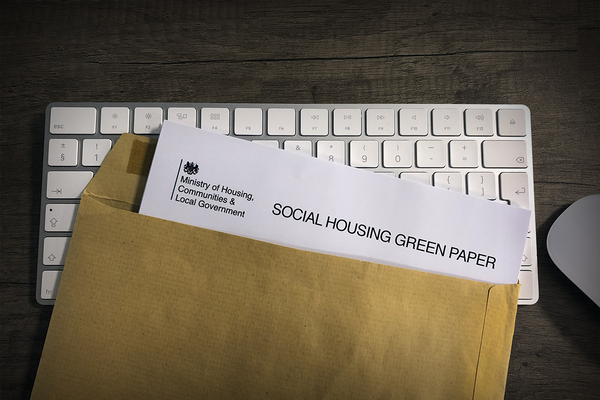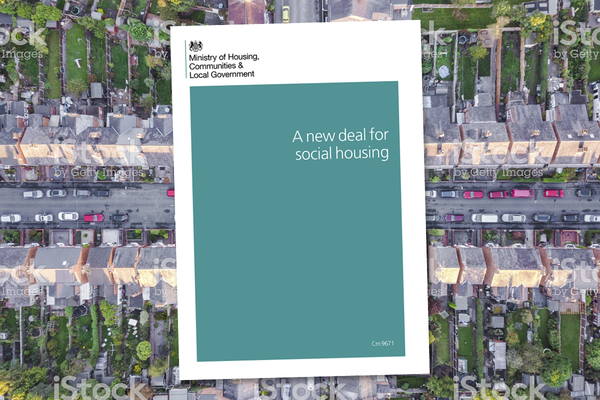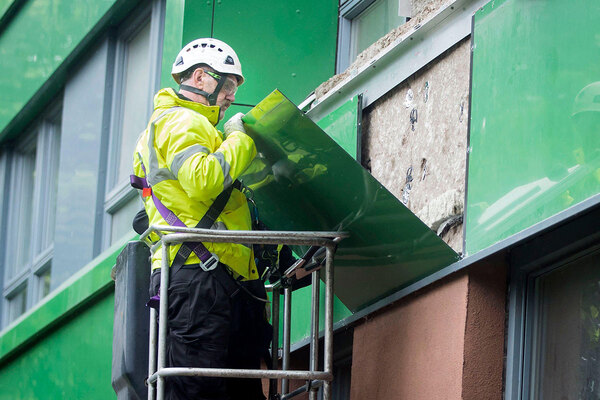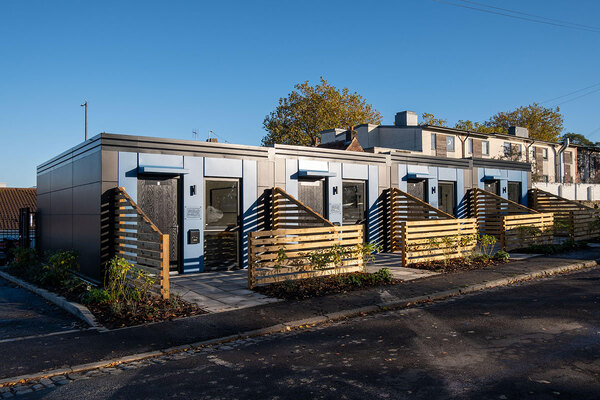 Jules Birch
Jules BirchWe need more than a week of delayed announcements bundled together
Jules Birch reflects on the government’s ‘Housing Week’ announcements
An open letter to James Brokenshire today puts a lacklustre Housing Week into true perspective.
Organised by the Conservative thinktank Onward, the letter calls for a change in the law to allow local authorities to buy land for housing at fair market value rather than a price that includes the ‘hope value’, which includes planning permission.
The call for a change to the 1961 Land Compensation Act is supported by a wide range of organisations, including thinktanks from across the political spectrum as well as Shelter, Crisis, the Joseph Rowntree Foundation, National Housing Federation, National Landlords Association, Generation Rent and even the Campaign to Protect Rural England.
And it is also signed by former Downing Street insiders Will Tanner and Neil O’Brien MP, now respectively director and advisory board member at Onward.
Reform to allow councils to buy land at close to existing use value would go much further than tentative government moves on land value capture, and open up the possibility of a new generation of new towns or urban extensions with funding for infrastructure and affordable housing.
“Last Monday’s Rough Sleeping Strategy and Tuesday’s Social Housing Green Paper had lots of warm words that lacked a wider vision or new money to back them up.”
There are caveats to this. First, any such measure would have to withstand resistance from powerful landed interests inside the Conservative Party with pockets deep enough to fund a legal challenge like the one that overturned compulsory purchase powers in the original New Towns Act and led to the 1961 act.
Second, while few would disagree that up to £9bn a year in land value gains could be put to better use than lining the pockets of landowners, there might be less agreement about what to do next: a report by Onward in June argued for a programme of discounted rent homes for young people to buy and appeared to argue for less, rather than more, social housing.
However, the contrast between this week’s call for reform and last week’s highlights is still a striking one.
Last Monday’s Rough Sleeping Strategy and Tuesday’s Social Housing Green Paper had lots of warm words that lacked a wider vision or new money to back them up.
In particular, the green paper saw a role for social housing as a safety net for people in need and a springboard into homeownership for those who can afford it – but what about the millions of people who want a secure, genuinely affordable homes but cannot afford to buy? Or those who cannot afford to live on the National Living Wage?
The green paper was followed on Wednesday by the launch of the prospectus for garden towns, the government programme that harks back to the garden cities and new towns of the past but is a pale imitation of both.
“What about the millions of people who want a secure, genuinely affordable homes but cannot afford to buy?”
But twin announcements on Thursday showed where the government’s priorities still lie.
First, James Brokenshire launched the Midlands Voluntary Right to Buy Pilot. The original national scheme may look dead in the water after the U-turn on the council housing sales levy that would have funded it, but it will still swallow up £200m of affordable housing funding.
Second, the latest round of statistics on the Help to Buy programme showed that other parts of the homeownership drive launched by David Cameron and George Osborne continue to flourish.
This revealed that 196,000 Help to Buy ISA bonuses worth £157m have already been paid out to support 147,000 property purchases.
In total more than 1.2 million accounts have been opened. Each of these offers a government bonus of up to £3,000 on top of savings, potentially costing the taxpayer £9.6bn by 2030.
That is on top of £8.9bn worth of Help to Buy equity loans taken out so far on 169,000 properties.
The question of course is who exactly is being helped. The scheme may have helped to boost housebuilding, but the biggest immediate beneficiaries have been house builder executives and shareholders.
A quarter of the properties (and 12% of houses) sold so far were leasehold and incredibly, even after the scandals so widely reported last year, 9% of house sales were still leasehold in the first quarter of 2018.
The scheme may benefit first-time buyers unable to save a big enough deposit, and it could yet return a profit to the taxpayer if prices continue to rise.
“The biggest immediate beneficiaries of Help to Buy have been house builder executives and shareholders.”
However, 17,000 applicants (10%) had a household income of more than £80,000, while 70,000 (42%) earned more than £50,000.
The question is how many of them could have afforded to buy anyway or are using an equity loan as a substitute for parental help.
The equity loan is free for the first five years, but attracts escalating fees after that. The first Help to Buy loans were taken out in the second quarter of 2013, so one clue will come when the government publishes data on the proportion of borrowers who are able to repay their loans in full.
Housing Week shows that the government realises it needs to take housing seriously – or at least that it needs to be seen to take housing seriously.
But it will take something much bolder than a week of delayed announcements lumped together in one of the quietest news weeks of the year to really make a difference.
Jules Birch, award-winning blogger
KEY PROPOSALS IN THE SOCIAL HOUSING GREEN PAPER
- New 'league tables' of housing providers based on key performance indicators, surrounding services such as repairs and neighbourhood management. This could be linked to housing grant.
- Consideration to scrapping of the current 'serious detriment' test, to allow 'Ofsted-style' tougher consumer regulation
- New home ownership options such as allowing tenants to buy as little as 1% of their property each year through shared ownership. This would only apply to new shared ownership purchases.
- Ditching of plans to force social landlords to offer fixed term tenancies rather than lifetime tenancies in social housing
- Ditching of plans to force councils to sell off their most valuable social housing when it becomes vacant
- The potential introduction a new stock transfer programme from councils to 'community-led' housing associations
- The return of guaranteed debt funding to help the development of affordable homes, and longer term 'strategic partnerships' for developing housing associations
Social Housing Green Paper: full coverage
All our Social Housing Green Paper coverage in one place:
Green paper measures are not enough to create May’s ‘new generation’ of council homes Green paper proposals are welcome but much more is needed to support councils to build, writes John Bibby
Green paper shows ministers now see associations as trusted partners Focusing on the failure of the green paper to address supply misses the point, writes Boris Worrall
Government should focus on building on what is already strong Philippa Jones considers the Social Housing Green Paper through a slightly different lens
We need more than a week of delayed announcements bundled together Jules Birch reflects on the government’s ‘Housing Week’ announcements
The regulator should monitor how associations assist homeless people Government announcements this week are positive, but any enhanced role for the English regulator should include looking at homelessness prevention work, argues David Bogle
The regulator’s role should be limited to dealing with systemic failures Julian Ashby suggests the Housing Ombudsman Service should deal with all complaints
The green paper shows ministers are in listening mode Despite some glaring omissions, the government appears to be in listening mode and it is important the sector takes advantage, argues Emma Maier
A short history of social housing league tables Attempts to create league tables for housing associations are nothing new. Mervyn Jones looks at how they have worked in the past
League tables could prove blunt and counter-productive, sector warns Housing figures criticise government proposals to measure social landlords against performance indicators
Government ‘must decide how proactive regulator should be’ on consumer standards Ministers now face a dilemma over the regulator’s focus, sector figures say
The Green Paper: a golden opportunity missed? Melanie Rees assesses the Social Housing Green Paper against recommendations drawn up by the Chartered Institute of Housing and finds the government comes up short
Longer strategic partnerships and guranteed debt to boost social housebuilding The Social Housing Green Paper outlines key ways of boosting supply
The green paper is remarkable progress but it is still not enough The green paper suggests the government appears to be re-writing much of its policy since 2010, but more needs to be done, writes Jules Birch
Green paper marks a ‘milestone’ on resident involvement The government’s recognition residents need clear information is to be welcomed, now it up to the sector to embrace tenant involvement, writes Paul Hackett
Ministers consider stock transfer programme to community-led associations The stock transfer programme could be revived under proposals in the housing green paper
Access to housing grant could be tied to new league tables Grant could be awarded according to how well landlords meet performance indicators, the paper suggests
Ofsted-style regulation of tenant services proposed The government is considering expanding the Regulator for Social Housing’s remit to intervene over tenant services and give it a more “proactive approach to enforcement”
Government proposes dropping one-for-one Right to Buy replacement commitment A consultation paper published alongside the green paper proposes a broader measurement to replace the one-for-one pledge
A list of recent housing policy U-turns The green paper confirms yet more housing policy U-turns from the government, which has spent the past two years dropping policy ideas developed under the David Cameron government. Here is a rundown of the major changes in policy direction
Sector welcomes green paper but calls for more ‘ambitious investment’ Reaction to the proposals, from the National Housing Federation, Chartered Institute of Housing and more
Morning Briefing: reaction to green paper announcements how the media reported the proposals trailed by the government overnight
Government drops plans to force councils to sell higher-value stock The government drops plans to force councils to sell higher value homes
League tables and ‘sharper teeth’ for regulator in social housing green paper Ministers reveal some of the things in the paper ahead of its publication
Grenfell survivors: green paper does not go far enough survivors of the Grenfell Tower fire have said the measures published in the Social Housing Green Paper do not do enough to rectify issues in the social housing sector












